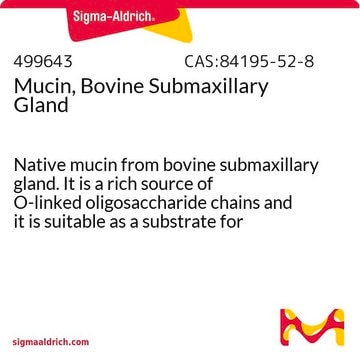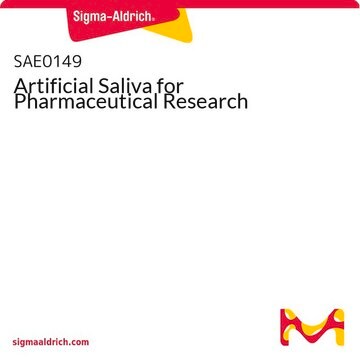M3895
Mucin from bovine submaxillary glands
Type I-S
Synonym(s):
MUC
About This Item
Recommended Products
biological source
bovine submaxillary glands
Quality Level
type
Type I-S
form
powder
composition
Bound sialic acids, 9-24%
technique(s)
electrophoresis: suitable
UniProt accession no.
storage temp.
−20°C
Gene Information
cow ... BSM(286841)
Looking for similar products? Visit Product Comparison Guide
Related Categories
General description
Application
- in the quantification of mucin
- as a component of artificial tear solution
- as a substrate for recombinant sialidase Gardnerella vaginalis
- to investigate a galactose-specific lectin from the red marine alga Ptilota filicina
- to study the characterization of a unique mucin-like glycoprotein secreted by a human endometrial adenocarcinoma cell line (Ishikawa)
Biochem/physiol Actions
Linkage
Substrates
Storage Class Code
11 - Combustible Solids
WGK
WGK 3
Flash Point(F)
Not applicable
Flash Point(C)
Not applicable
Personal Protective Equipment
Choose from one of the most recent versions:
Certificates of Analysis (COA)
Don't see the Right Version?
If you require a particular version, you can look up a specific certificate by the Lot or Batch number.
Already Own This Product?
Find documentation for the products that you have recently purchased in the Document Library.
Customers Also Viewed
Articles
Understand sialic acid structure, function, signaling, and modifications. Easily find products for sialic acid research.
Understand sialic acid structure, function, signaling, and modifications. Easily find products for sialic acid research.
Understand sialic acid structure, function, signaling, and modifications. Easily find products for sialic acid research.
Understand sialic acid structure, function, signaling, and modifications. Easily find products for sialic acid research.
Our team of scientists has experience in all areas of research including Life Science, Material Science, Chemical Synthesis, Chromatography, Analytical and many others.
Contact Technical Service













